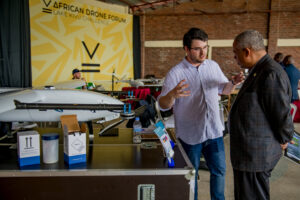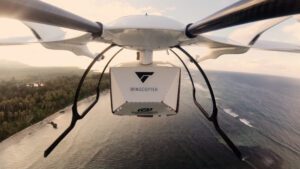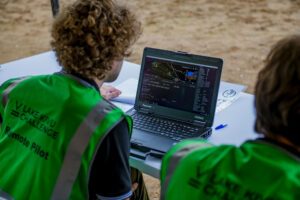
The drone industry is an increasingly tough business. As the industry begins to mature, it can be more difficult for startups to get a seat at the table to partner with government agencies and large customers – and that’s an environment that limits innovation.
That’s what makes the Lake Kivu Challenge interesting. The African Drone Forum and stakeholders from all over the globe are coming together to compete: enabling them, whether they win first place or not, to demonstrate their technologies and take the opportunity to explore some specific needs identified by African governments. It’s an extremely efficient and fair approach, and it aligns with the strategy of governments like host country Rwanda in choosing technology partners.

It isn’t only drone manufacturers participating in the challenge. Providers of unmanned traffic management (UTM) systems also demonstrated capabilities: U.K.-based Altitude Angel, umbrella and lead UTM provider; Dubai-based Exponent; and Belgian UTM company Unifly. Risk management is provided by U.K.-based drone insurance provider Flock.
Medical Delivery
Three finalists will deliver a package that weighs 1 kg, taking off from the droneport at Lake Kivu and landing on an island in the lake. Competitors will be judged on speed and payload delivery.

Wingcopter has a big name with their VTOL/fixed wing hybrid delivery drone. They’ve already had success working with DHL in Tanzania and other projects – and with backers like pharma giant Merck, they’re beginning to scale. They use a winch mechanism to drop the payload (a compostable, disposable payload box in this case) with incredible accuracy.
German Drones will fly the Songbird VTOL drone. Their founder says the design is intended to take the advantages of quadcopters – no infrastructure required – and combine them with the longer flight times of fixed wing deesign. They’ve proven the concept in applications from inspection to security: and now in package delivery.
Avy is a humanitarian drone company with an innovative and powerful fixed wing built on open source operating software. Founder Patrique Zaman says that 20% of life-saving products are broken or wasted because of storage conditions: the Avy aircraft has a specialized payload safe that keeps medical supplies at the required temperature. “The way out is the way up,” says Zaman. “It’s time for an aviation revolution.”
Sample Pick Up
Teams must pick up samples from a remote island and deliver them to Karongi in a set amount of time: the team that collects the most samples will win the contest.

Munich’s Pheonix Wings is a new player in the cargo drone space. In addition to an VTOL aircraft designed around the payload, Pheonix Wings also designs all of their own software. Their “signature move” is an elegant transition to horizontal flight. They’ll fly their Manta Ray aircraft: a large volume, heavy lift drone – but the model can be adapted to the mission.
Spanish Venturi is already working in energy industries using LiDAR, doing visual inspections, digital terrain modeling, security and more. The Venturi aircraft is made from kevlar and carbon fiber, creating a durable and customizable platform. They offer a full-service partnership with a rent or buy option.
U.S.-based Volansi offers a fully autonomous delivery platform. They’re out to solve logistics problems – and they’re currently working in major global industries like mining, where they can delivery supplies and spare parts by drone. “We believe we’re at the cusp of a logistics revolution,” says Volansi’s spokesman.
Find and Assess
“Find and Assess” is the logical precursor to “Search and Rescue.” Drones will fly from the shore to an island and identify markers – both on land and on boats in the water. The team that accurately identifies the most markers will win the competition.
European company senseFly is a well known industry name in fixed wing drones – and their competitive edge is their deep experience in BVLOS flight and mapping with thermal imagery, including for flooding and disaster response. “The future of drones is BVLOS,” says senseFly’s spokesperson.
 South Korea’s Hojung Soutions began as a land survey company – but have quickly transformed into a drone technology company. They’re flying the Remo, perhaps the most unique drone in the contest. Remo is a hand-launched drone, which allows the it to be used in small spaces: and it’s incredibly accurate landing – on an airbag – is another unusual solution feature. They offer sophisticated data processing and delivery – and they have a deep global experience in acquiring geographic data.
South Korea’s Hojung Soutions began as a land survey company – but have quickly transformed into a drone technology company. They’re flying the Remo, perhaps the most unique drone in the contest. Remo is a hand-launched drone, which allows the it to be used in small spaces: and it’s incredibly accurate landing – on an airbag – is another unusual solution feature. They offer sophisticated data processing and delivery – and they have a deep global experience in acquiring geographic data.
Leapr Labs is a Rwandan company, an innovation center that a new drone design competing in the challenge. Leapr Lab’s local knowledge – and the fact that the drone is designed locally and can be easily maintained locally, are differentiators.
German startup Qlex is a new drone industry player. The new consortium offers the Qlex Creo: a drone with an innovative electronic propulsion system which makes it silent and robust – and offers an impressive flight endurance of about 5 hours. Designed for universal payloads, Creo offers a solution for precision agriculture, inspection, and geology.
Whichever company wins the competition, the participants have already gained major exposure to critical stakeholders and high level customers – access that gives these companies a great opportunity to participate in Africa’s drone industry.

Miriam McNabb is the Editor-in-Chief of DRONELIFE and CEO of JobForDrones, a professional drone services marketplace, and a fascinated observer of the emerging drone industry and the regulatory environment for drones. Miriam has penned over 3,000 articles focused on the commercial drone space and is an international speaker and recognized figure in the industry. Miriam has a degree from the University of Chicago and over 20 years of experience in high tech sales and marketing for new technologies.
For drone industry consulting or writing, Email Miriam.
TWITTER:@spaldingbarker
Subscribe to DroneLife here.







[…] dans la livraison de drones augmente et la société allemande primée Wingcopter “non seulement développe et fabrique des drones de livraison autonomes, mais exploite également une infrastructure de livraison par drone en tant que service. […]